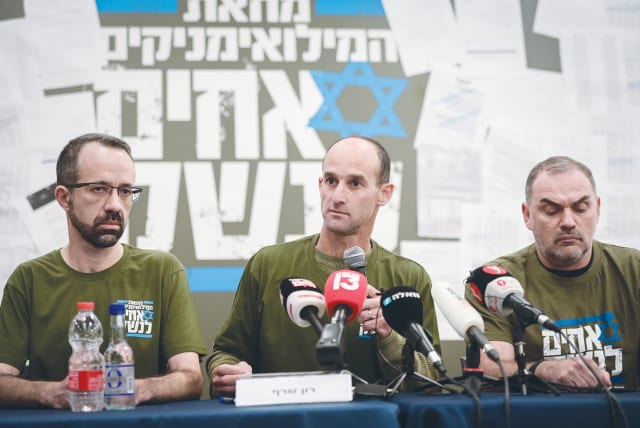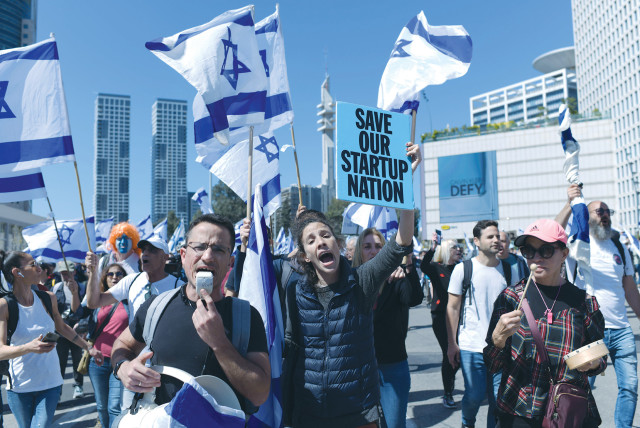How reality surprised theory in the reform protests - opinion

Under certain conditions, not only is there no contradiction but, on the contrary, nationalistic loyalty strengthens the commitment to liberal and democratic values.
For dozens of years, philosophers, politicians and journalists have been telling us that there is an unbridgeable contradiction between nationalism and liberalism or, in the local version, between Jewish nationalism and democracy. But one of the fascinating and surprising lessons that the present protest has taught us is that, under certain conditions, not only is there no contradiction between the two but, on the contrary, nationalistic loyalty strengthens the commitment to liberal and democratic values.
The Jewish-Zionist flag has become the protest’s flag which is proudly raised above the calls for equality, fairness and justice. Furthermore, in a manner that could not have been predicted in advance, many of the demonstrations and rallies conclude with the singing of “Hatikvah” (Israel’s national anthem), perceived in these contexts not as a way to express and reinforce Jewish ethnocentrism (as critics have stated over the years), but as a way to express and reinforce the desire for a freer and more equal society. The emphasis in the minds of those singing is not on the line “The Jewish soul yearns” but rather on “To be a free nation in our land.”
One might argue that this use of national symbols is cynical, namely, that the demonstrators do not really identify with the flag that they fervently wave and with the national anthem they sing, but do so only because they think it might advance their political agenda. However, if the tens of thousands of demonstrators for equality and freedom, or the potential demonstrators that the organizers are attempting to enlist, were indifferent to the flag, it is unclear how the cynical and instrumental use of it would succeed. Furthermore, anyone participating in the protests in recent months would have felt first-hand the authentic emotion in the crowd as they sing “Hatikvah,” and the excitement emanating from the calls for a just and free society, amidst a sea of blue and white flags.
How can this be explained? The answer lies in the way in which group loyalty influences the feelings and behaviors of group members of a group. Such loyalty is not fixed but depends on the group’s self-identity. If this identity is perceived as including a commitment to human rights as one of its core components, then acting for the sake of protecting these rights is likely to be perceived as an expression of group membership, not as a deviation from or as a threat to it. The wonderful thing that is taking place in the current protest is that a growing number of Israelis perceive the struggle for freedom and justice as an authentic expression of their Zionist identity. They are engaged in this struggle not despite the fact that they are Zionists, but because they are Zionists.
Militarism and liberal values can coexist
The protest has not only shattered the myth regarding the harmful influence of one’s commitment to Zionism on one’s commitment to human rights, but another myth as well, which deals with the perceived conflict between one’s commitment to the army – militarism, to use the vocabulary of the critics – and one’s concern for liberal values. “Brothers in Arms” is one of the most prominent associations in the protest, bringing together dozens of reserve soldiers and officers, who invest days and nights in organizing the protest.
They explicitly and consciously bring their military expertise to the protest, on an organizational, creative and operational level. With regard to them as well, their self-identification as soldiers and officers not only does not undermine their commitment to democracy but the contrary; they regard their identity as military personnel as including an obligation to protect the state as a democratic state, as well as protecting its physical existence.
There is a price to be paid for the Jewish-Zionist- “military” character of the protest: It makes it difficult for Arab citizens to take part in them. The sea of blue and white flags and the Jewish and Zionist rhetoric makes their participation almost impossible.
But first of all, even if the rallies on Kaplan Street had been free of Zionist symbols, they would not have attracted many Arabs. The main reason is that the Arabs have so long been victims of various forms of discrimination that they can’t fully identify with the current – mostly Jewish – calls for the protection of liberal and democratic values.
Second, given the effectiveness of these symbols in promoting the protest, relinquishing their use would be a high price to pay. Third, enlisting Jewish-Zionist identity in the protest in order to deepen the commitment to freedom and equality may – in a surprising way – work to the benefit of the Arab public. When Israeli Jews become accustomed to seeing their Jewish-Zionist identity as including a commitment to equality and freedom, they will be more likely to show up in Umm el-Fahm with the blue and white flag, not in order to stir up discord and hatred, but rather to bring a message of respect and hope.
The right way to turn Israel into a more liberal state is, therefore, not by weakening national symbols and Jewish-Zionist identity. It is by loading or reloading them with an unwavering commitment to freedom, justice and equality. If we will it, it is no dream.
The writer is a senior fellow in the Israel Democracy Institutes’s Human Rights and Judaism Program. He is also a lecturer in the philosophy department of the University of Haifa and specializes in ethics and political philosophy.
Jerusalem Post Store
`; document.getElementById("linkPremium").innerHTML = cont; var divWithLink = document.getElementById("premium-link"); if (divWithLink !== null && divWithLink !== 'undefined') { divWithLink.style.border = "solid 1px #cb0f3e"; divWithLink.style.textAlign = "center"; divWithLink.style.marginBottom = "15px"; divWithLink.style.marginTop = "15px"; divWithLink.style.width = "100%"; divWithLink.style.backgroundColor = "#122952"; divWithLink.style.color = "#ffffff"; divWithLink.style.lineHeight = "1.5"; } } (function (v, i) { });

